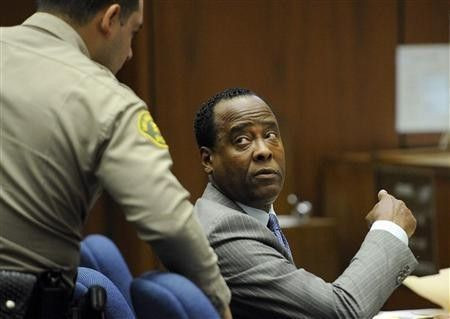Jackson Estate Slams Conrad Murray Documentary

Michael Jackson's estate on Wednesday slammed a tell-all documentary about the doctor convicted of causing the singer's death, and urged a TV network not to allow the physician to tell his story in which he labels the singer a drug addict.
Dr. Conrad Murray, who sits in a Los Angeles jail awaiting sentencing for Monday's involuntary manslaughter conviction in the singer's death by drug overdose, is scheduled to appear in the documentary called Michael Jackson and the Doctor to air this coming Friday on cable TV network MSNBC.
On Thursday, NBC will broadcast the first part of a two-part interview Murray gave to journalist Savannah Guthrie before the verdict was returned at his trial. The interview will air on morning show Today, which is promoting the related documentary on sister network MSNBC.
In the interview, Murray defends his care of the Thriller singer by saying Jackson was an addict and drug-addicted people act in a way that is unreasonable, which Murray could not have foreseen.
The doctor's defense attorneys argued at trial that Jackson gave himself the drug that was responsible for his death, but the jury did not agree.
In a letter on Wednesday, Jackson estate administrators John Branca and John McClain said that even though Murray did not testify at his trial, MSNBC was allowing Murray to speak without fear of being grilled by court prosecutors.
Thus, MSNBC gives Conrad Murray a platform to shift the blame post-conviction to Michael Jackson, even though a jury considered the evidence and rejected this very argument, the letter states. We demand that you exercise proper judgment and refrain from airing this program.
Murray began working with the filmmakers behind the Michael Jackson and the Doctor project in November 2009 -- following Jackson's death on June 25 of that year -- and continued to appear on camera during his trial.
The letter was addressed to executives with NBC, MSNBC and parent company Comcast Corp. A representative from MSNBC could not immediately be reached for comment on the letter.
JACKSON CALLED 'ADDICT'
Medical examiners found Jackson's death resulted from an overdose of the anesthetic propofol and sedatives.
Murray admitted to police that he gave Jackson those drugs as a sleep aid at the singer's mansion, but his attorneys argued the singer self-injected a fatal dose of propofol.
During the NBC interview, Guthrie asked the doctor if he was right to leave Jackson alone in his bedroom knowing he could self-inject the drug. Murray said he could not have foreseen that possibility.
Had I known what I know today in retrospect, that Mr. Jackson was an addict, and he had shared that information with me, addicts may behave in a way that is unreasonable and you may consider it, Murray said in the interview.
Murray's attorneys had argued during his trial that Jackson was addicted to the painkiller Demerol that he received from another doctor in the weeks before his death, but they barely mentioned any possible addiction to propofol.
Jackson's family has denied that Jackson was addicted to Demerol, and an autopsy did not reveal any amount of that painkiller in the singer's system.
Propofol expert Dr. Steven Shafer testified for prosecutors during the trial and disputed the defense's theory that Jackson had self-injected the drug. Instead, Murray likely set up an intravenous drip of propofol for Jackson that stopped his breathing, Shafer said.
The physician, who faces the possible loss of his medical license as a result of his involuntary manslaughter conviction, will return before a judge for a hearing on November 29, when he could be sentenced to up to four years in prison.
© Copyright Thomson Reuters 2024. All rights reserved.





















